In the rapidly evolving digital landscape, dating app development is a significant endeavor that requires careful planning and substantial investment.
This guide provides a detailed exploration of the costs and considerations involved in dating app development, integrating current trends and real data to offer valuable insights.
Statista predicts that the online dating market will make about $3.17 billion worldwide in 2025. It is expected to grow by 2.14% each year, reaching around $3.45 billion by 2029.
Here is a clear, well-structured explanation of dating app development costs-
1. Planning and Research
The foundation of any dating app development begins with thorough planning and research.
This phase involves market research to understand user needs, competitor analysis, and identifying the target audience.
Defining the app’s unique selling points is crucial.
Costs for this phase can range from $0 to $5,000, depending on whether you hire a consultant or market research firm.
This phase sets the stage for the entire project, ensuring that the app meets market demands.
2. Dating App Design
Design is a critical aspect of a dating app, as user experience and interface play a significant role in user retention.
Hiring a UI/UX designer or agency can cost between $2,000 and $30,000.
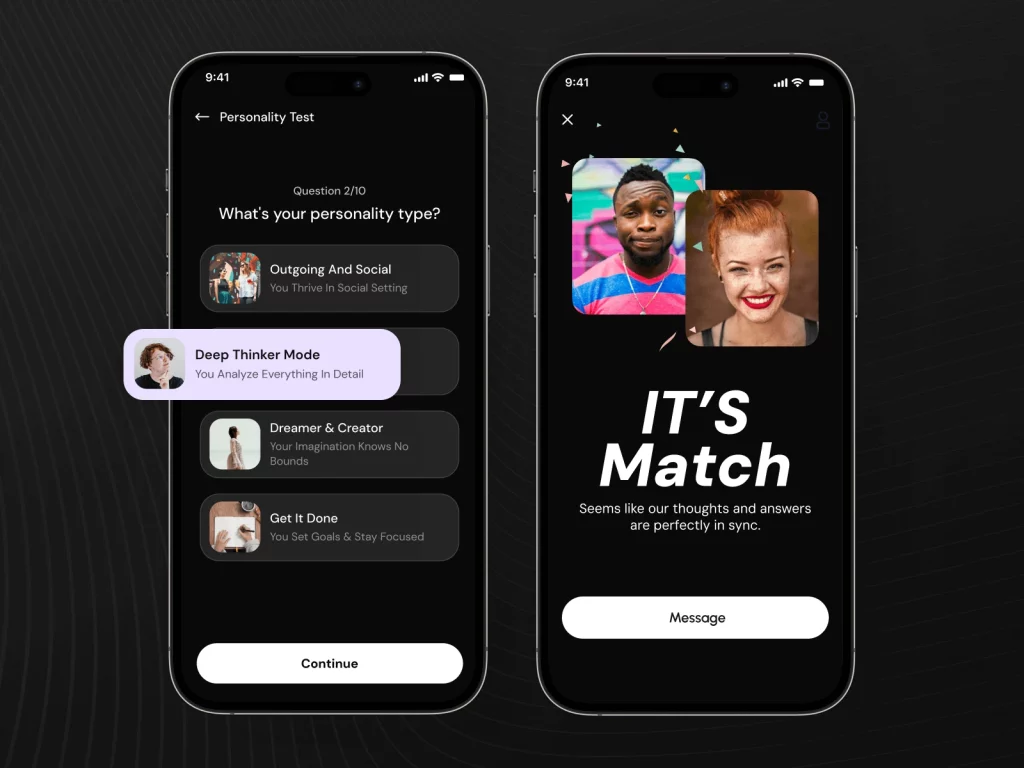
Check this blog for more about dating app UI and UX design
Tools like Adobe XD or Figma are commonly used for design work. A visually appealing and intuitive interface is essential for attracting and retaining users.
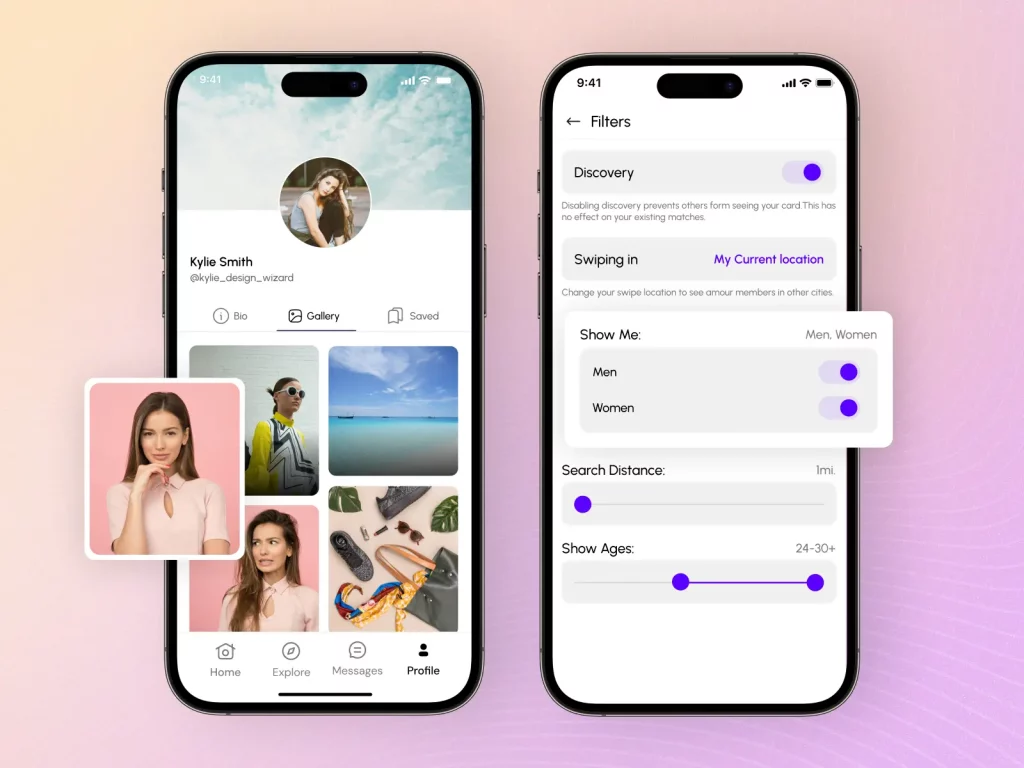
You can check the similar design on the dribble post
3. Dating App Development
Development is the most extensive phase, involving front-end and back-end work.
Choosing between native (Swift for iOS, Kotlin for Android) or cross-platform frameworks like React Native or Flutter can impact costs.
Specific features such as AI matching, video calls, or in-app purchases can increase Dating App development costs.
Hiring an in-house team might cost more than outsourcing to a Dating App Development Company or freelancers. Dating App Development costs can range from $20,000 to $150,000, depending on the features and platform chosen.
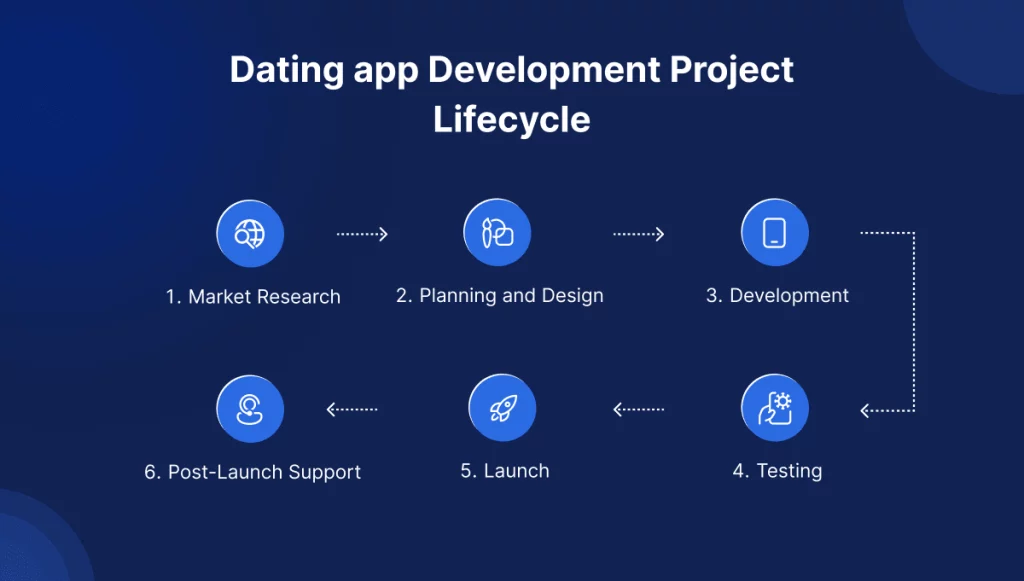
4. Testing and Quality Assurance
Ensuring a bug-free and smooth app experience requires various testing types, including unit testing, integration testing, and user acceptance testing.
Costs for QA can be 10-20% of Dating App Development costs. Continuous testing is essential for maintaining app quality and user satisfaction.
5. Launch and Compliance of Dating app
Launching the app involves compliance with App Store and Google Play guidelines, along with data privacy laws like GDPR.
Legal consultations may be necessary, adding to the costs in dating app. Launch expenses can range from $1,000 to $5,000, depending on marketing efforts and compliance requirements.
6. Maintenance and Updates
Ongoing maintenance is crucial for keeping the app functional and secure.
Annual maintenance costs can range from $3,000 to $15,000, including bug fixes, feature updates, and platform updates.
7. Additional Costs for Dating App Development
- Server Hosting: $100 – $500 monthly
- Payment Gateway Integration: $500 – $2,000
- Legal Fees: $1,000 – $5,000 for privacy policies and compliance
8. Monetization and Marketing
Monetization strategies include subscriptions, in-app purchases, ads, and premium features.
Marketing involves user acquisition costs, advertising strategies, and budget allocations. Understanding these strategies is crucial for generating revenue and attracting users.
9. Current Trends and Real Data
Incorporating trends like AI-driven matching, video calls, and gamification can enhance app appeal.
Real data and case studies provide insights into cost structures and potential returns. For example, a recent study showed that apps with AI matching saw a 20% increase in user engagement.
10. Security Measuresin Dating App Development
Given the sensitive nature of user data, robust security measures are essential. Costs for security implementations can vary but are crucial for building user trust and compliance with regulations.
Types of Dating App
When developing a dating app, choosing the right type and size is crucial for success in today’s competitive market.
The goal is to create an engaging platform that attracts users and generates revenue while offering meaningful connections.
Let’s explore the main categories of dating apps and their key features.
Dating apps generally fall into four distinct categories, each serving different user needs.
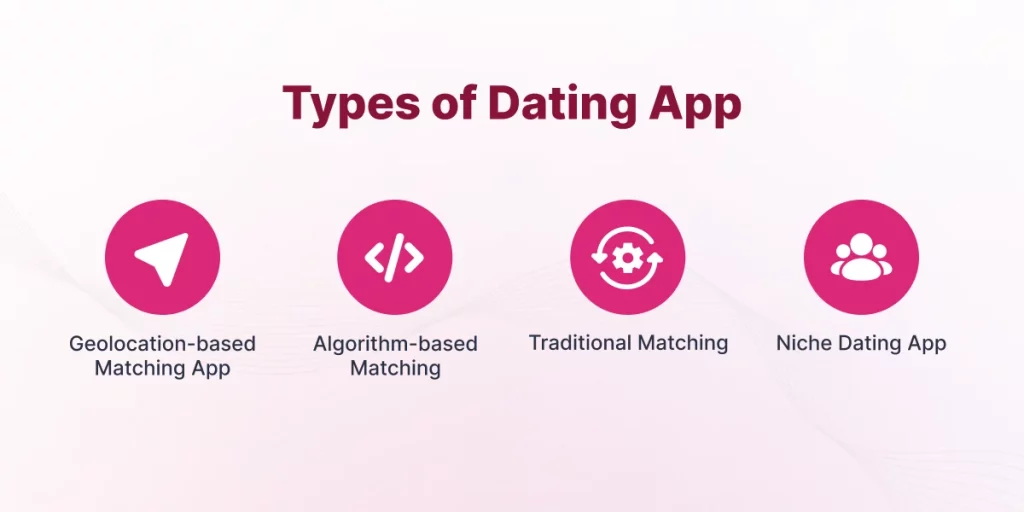
1) Geolocation-based Matching App
Geolocation-based apps connect users based on physical proximity, showing potential matches within a specific radius.
Popular examples use location services to help users find nearby connections, making them especially useful in urban areas.
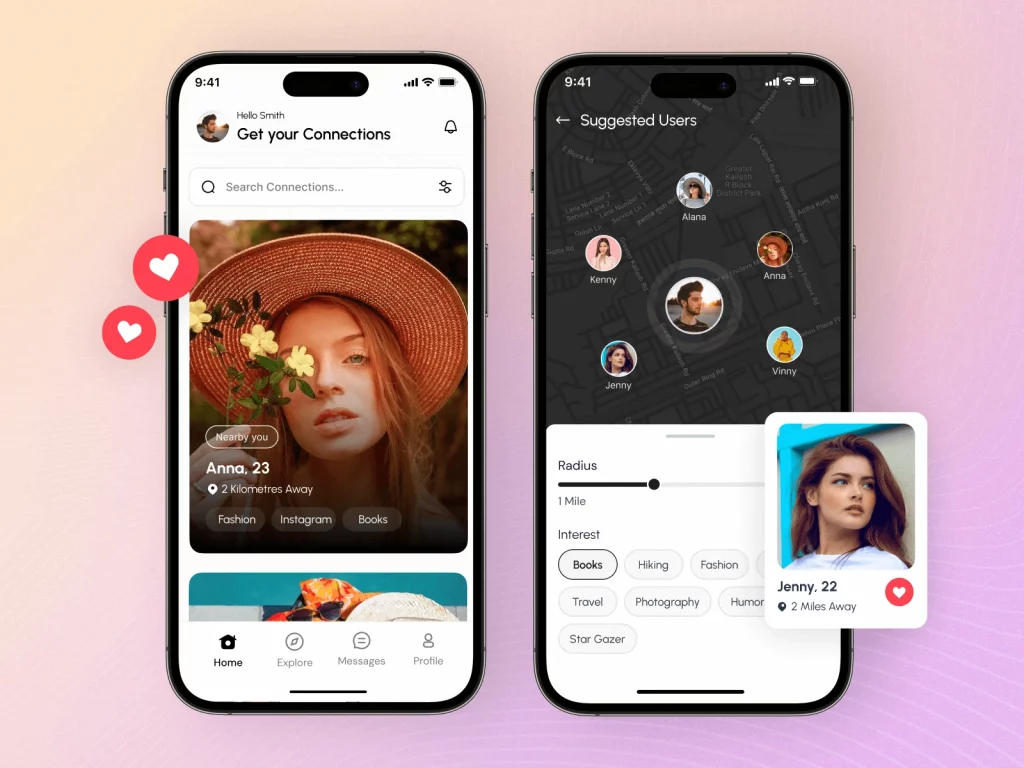
2) Algorithm-based Matching
Algorithm-based matching apps use sophisticated surveys and behavioral analysis to suggest compatible partners.
These apps consider factors like interests, values, and lifestyle choices to create more meaningful connections.
This approach often leads to higher user satisfaction and longer-term relationships.
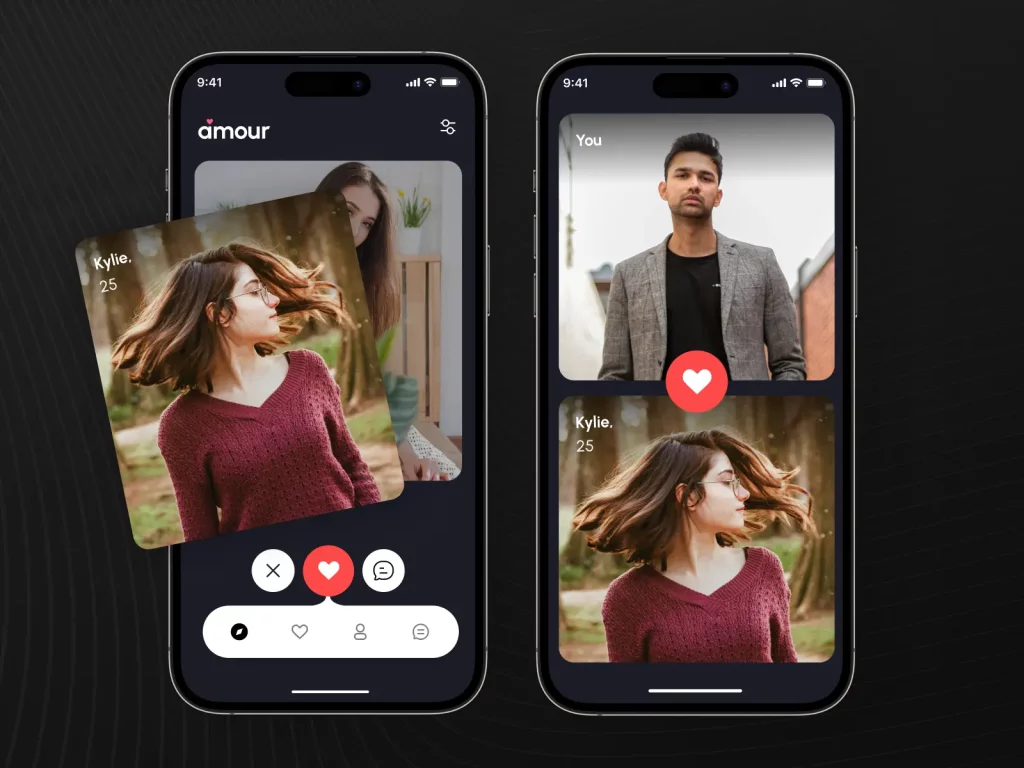
3) Traditional Matching
Traditional matching apps incorporate basic dating algorithms with simpler interfaces.
These apps typically offer straightforward functionality without complex matching systems, making them more accessible to users who prefer a streamlined experience.
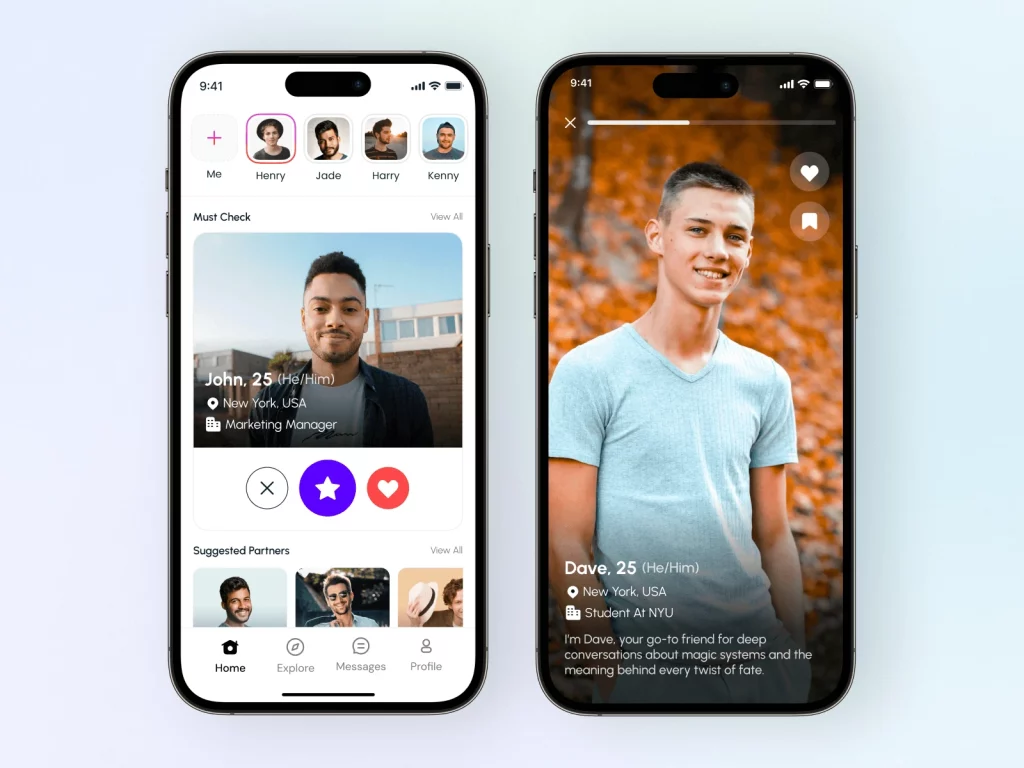
4) Niche Dating App
Niche dating apps target specific demographics or communities. These specialized platforms might focus on particular professions, interests, or lifestyles.
They often include unique features tailored to their target audience, such as enhanced privacy settings or specialized matching criteria.
The size and complexity of your app will depend on which features you choose to implement.
While basic apps might start with one matching type, more comprehensive platforms often combine multiple approaches to appeal to a broader user base.
Remember that each additional feature increases development time and costs but can also enhance user engagement and satisfaction.
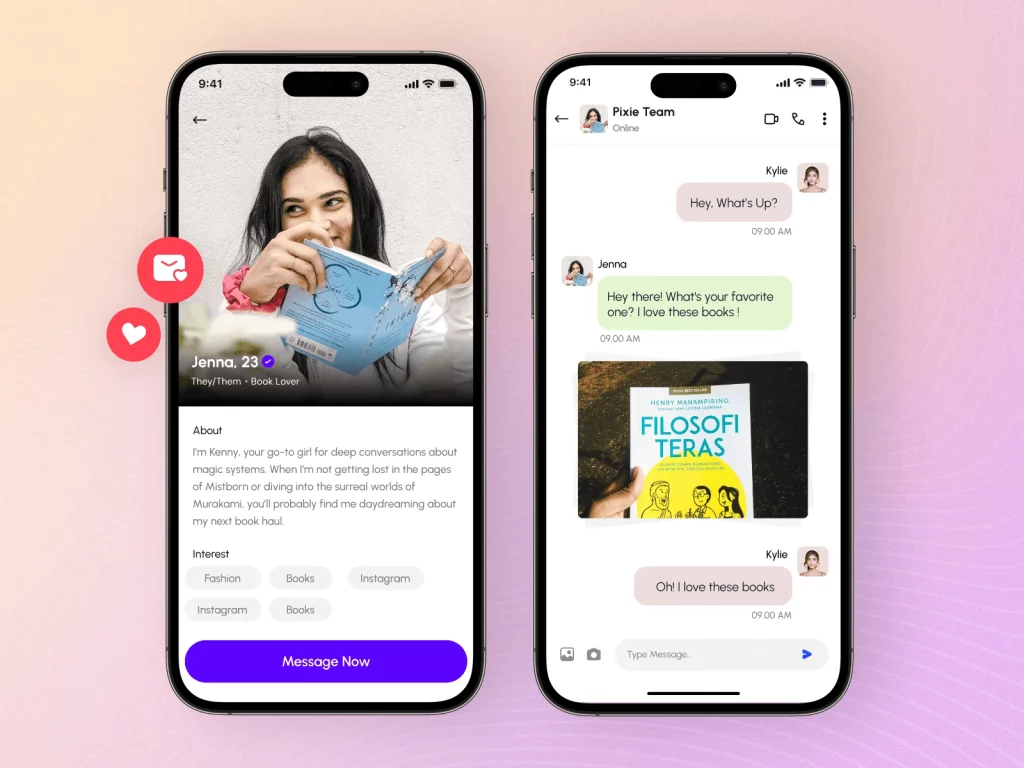
Detailed Breakdown of Costs
1. Testing Costs
- Unit Testing: $2,000 – $5,000
- Integration Testing: $3,000 – $8,000
- User Acceptance Testing (UAT): $4,000 – $10,000
- Security Testing: $3,000 – $7,000
- Performance Testing: $2,000 – $6,000
Total Testing Costs: $10,000 – $36,000
2. Features That Affect Cost
- Basic Features:
- User Registration and Login: $2,000 – $5,000
- Profile Creation: $3,000 – $7,000
- Matching Algorithm: $5,000 – $15,000
- Messaging: $4,000 – $10,000
- Advanced Features:
- AI-Driven Matching: $10,000 – $20,000
- Video Calls: $8,000 – $15,000
- In-App Purchases: $5,000 – $12,000
- Gamification: $7,000 – $15,000
3. Type and Size of the Dating App
- Minimum Viable Product (MVP):
- Cost: $20,000 – $50,000
- Features: Basic user registration, profile creation, messaging, and simple matching algorithm.
- Standard Dating App Development:
- Cost: $50,000 – $100,000
- Features: Advanced matching algorithm, video calls, in-app purchases, and basic gamification.
- Premium Dating App Development:
- Cost: $100,000 – $200,000
- Features: AI-driven matching, advanced gamification, premium subscription models, and extensive security measures.
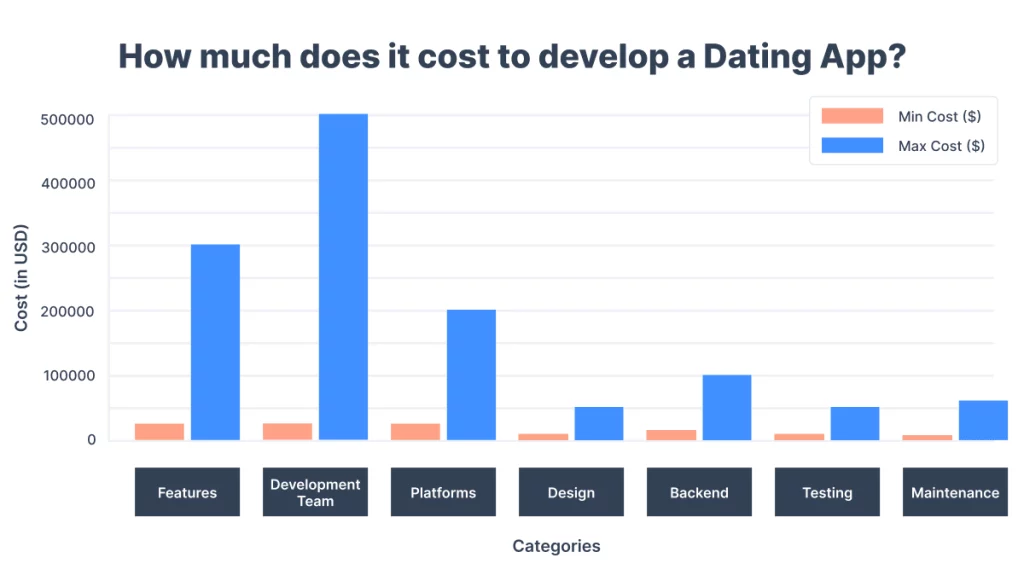
Current Trends and Real Data
- AI-Driven Matching: Apps like Tinder and Bumble are increasingly using AI to improve matching accuracy. A study by McKinsey found that AI can increase user engagement by up to 20%.
- Video Calls: The rise of video dating has led to increased demand for video call features. According to a survey by Statista, 60% of users prefer video calls over text messaging.
- Gamification: Gamification elements like badges and rewards can increase user retention. A case study by Playtika showed a 30% increase in user retention with gamification.
Conclusion
Dating App development is a complex process with costs ranging from $50,000 to $200,000, depending on features and choices.
This guide offers a comprehensive overview, emphasizing the importance of Dating App Planning, Dating App Design, Dating App Development, and ongoing maintenance. By understanding these factors, Dating App Developers can make informed decisions to create a successful and sustainable Dating App.
You can also check how to create a dating app in detail.
Final Tips
- Start with an MVP: Test the market with a basic version of the Dating App before investing in advanced features.
- Prioritize Features: Focus on features that offer the most value to users on Dating App.
- Consider Ongoing Costs: Plan for maintenance, hosting, and marketing expenses for your Dating App.
- Stay Updated with Trends: Incorporate current trends to keep the Dating App competitive.
This guide aims to provide a clear and insightful path for anyone considering building a Dating App Development, ensuring they are well-prepared for the journey ahead.
Support
We provide a wide range of dating app development services with top-notch features that attract your potential customers.
If you require any further assistance, please reach out to us through [email protected] or you can create a ticket as well.
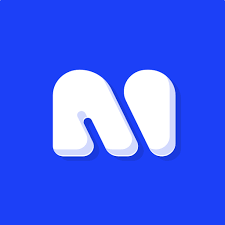
Be the first to comment.